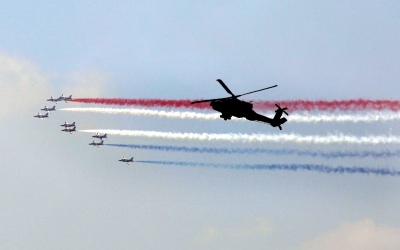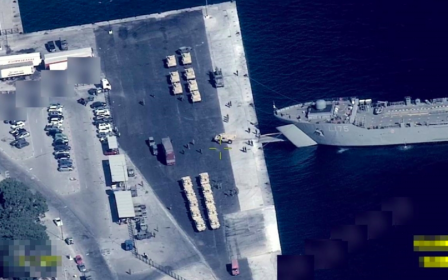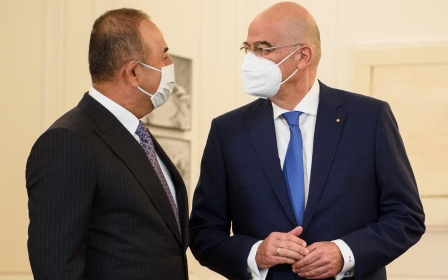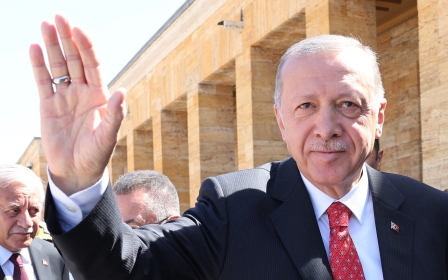Where can Turkey buy fighter jets if US F-16 deal falls through?
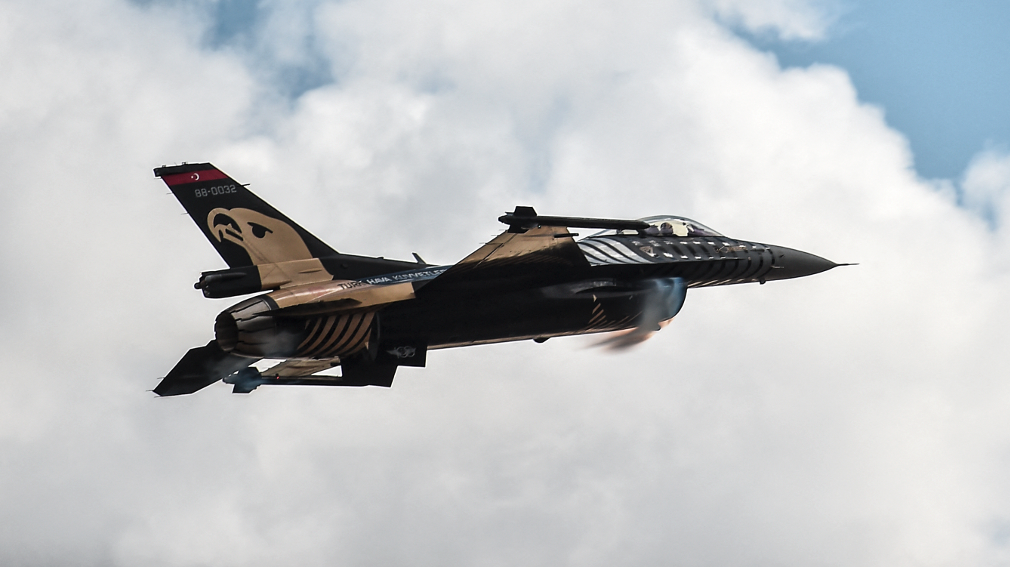
Turkey and the United States are still in negotiations over a multi-billion dollar sale of F-16 Viper fighter jets which are crucial to Turkey's efforts to upgrade and modernise its air force. While US President Joe Biden is in favour of the deal, there remains strong opposition in Washington.
In July, the House of Representatives approved legislation prohibiting the administration from selling the F-16s, unless Ankara could prove the deal was vital for US national security. Further complicating things, Turkey must not use them for unauthorised overflights of Greece - but officials have declared they would not abide by any such restrictions.
If the sale is ultimately cancelled, Turkish President Recep Tayyip Erdogan is confident that his country has other options.
"The US is not the only one selling warplanes in the world. The UK, France and Russia sell them as well," he said on 9 September. "It's possible to procure them from other places, and others are sending us signals."
In another interview on 19 September, Erdogan once again broached the issue.
"If we can't get the results out of the United States about the F-16s, what are we going to do? Of course, we're going to take care of our own selves," he said, without elaborating.
Then on 23 September, Erdogan's spokesperson Ibrahim Kalin confirmed Turkey was negotiating with Europe regarding its Eurofighter Typhoon jet, adding, "Turkey will never be without alternatives".
The following day, the head of Turkey's Presidency of Defense Industries (SSB), Ismail Demir, suggested Ankara could acquire Sukhoi Su-35 Flanker-E fighters from Russia. In 2019, reports indicated Russia was offering Turkey 36 Su-35s. At that time, Demir said Turkey was evaluating the offer.
Modernisation
In 2019, the US banned Turkey from buying the fifth-generation F-35 Lightning II stealth fighter shortly after Ankara received its first delivery of the advanced Russian S-400 air defence missile systems. Turkey's plan was to buy up to 100 F-35s to modernise its air force.
"Ankara is desperately in need of modernising and boosting its air force capabilities," Suleyman Ozeren, a professorial lecturer at the American University and senior fellow at the Orion Policy Institute, told Middle East Eye.
'Ankara is desperately in need of modernising and boosting its air force capabilities'
- Suleyman Ozeren, Orion Policy Institute
"For example, while Turkey was pushed out of the F-35 fighter jet programme, Greece requested to purchase several F-35s," he said. "Greece also purchased French Rafales, which improved Greece's air force capabilities significantly."
The bulk of Turkey's fighter fleet consists of F-16s, however, many are old models and need significant upgrades. That is why, last October, Turkey pushed the deal for 40 brand new Block 70/72 F-16s, the most advanced variant of the aircraft, along with 80 modernisation kits for its existing fleet.
Without acquiring modernised F-16s, or another 4.5-generation fighter, the Turkish Air Force could become seriously outdated by the end of this decade.
Lockheed Martin, the manufacturer of the F-16, is already upgrading 83 of Greece's F-16s to the Block 72 configuration, making them the most advanced F-16s in Europe. Athens received the first two of these upgraded jets on September 12.
If Turkey's F-16 deal is not approved, Greece will have a far more advanced F-16 fleet and a significant number of cutting-edge F-35s and Rafales by the second half of the 2020s.
In his recent remarks, Erdogan suggested Turkey had viable alternative options for fighters from Russia and Europe, but is this really the case?
Russian fighter jets a 'non starter'
"Under the current circumstances, Erdogan's claim that Turkey would purchase [Russian] Sukhois is a non-starter, which will trigger severe sanctions by the United States and maybe other Western countries against Turkey," Ozeren said.
"More importantly, this option would make no contribution to Turkey's immediate needs."
Emily Hawthorne, a senior Middle East and North Africa analyst with the RANE risk intelligence company, echoed the notion that acquiring jets from Russia is a diplomatic minefield:
"It would only increase the sanctions pressure that Turkey is already facing from the US and the diplomatic furore it is facing from other Nato countries," she told MEE.
Hawthorne added that, as long as the war in Ukraine continues, Turkey will likely avoid pursuing major military purchases from Russia - due largely to the optics.
"Russia is always an option, but it is an option that would invite diplomatic pressure, sanctions risk, and a likely chill on obtaining high-tech equipment from companies in Nato countries," she added.
European options
"The potential vendors for Turkey have not changed. It is Russia and Europe," Aaron Stein, a senior fellow at the Foreign Policy Research Institute, told MEE.
If the F-16 sale is blocked, Stein believes Ankara would most likely opt for buying the Eurofighter, as has already been signalled in Turkey's state-run press.
In June, MEE also revealed that Turkey might be interested in the Eurofighter if the F-16 deal were not to not progress.
"However, a purchase of the Eurofighter would require a significant shift in logistics and maintenance operations, and I would argue, increase the overall hit to the budget in the near-to-medium term," Stein said.
"While Turkey is opaque and we do not know much about how money is spent, there is obviously some sort of limit, and they will have to decide how to allocate a finite amount of resources."
'While Turkey is opaque and we do not know much about how money is spent, there is obviously some sort of limit'
- Aaron Stein, Foreign Policy Research Institute
Aside from the Eurofighter, the other two advanced 4.5-generation fighters available on the European market are France's Rafale and the Swedish Saab JAS 39 Gripen.
Ozeren believes the Eurofighter and the Gripen are the two best options for Turkey, both in terms of operability and feasibility.
"However, Rafales could also boost Turkey's air force capabilities," he said. "The problem with the Rafales option is that Greece has already purchased these fighter jets, and given the current tensions between Turkey-Greece and France's position, Rafales would not be a feasible option."
While Swedish Gripens could provide Turkey with capabilities comparable to the Rafale, Ozeren said Ankara's "position vis-a-vis the Swedish Nato membership process could put both countries in a peculiar situation".
Consequently, he argued the Eurofighter would be the best of the three European options, "given the British desire to deepen its military cooperation with Turkey".
"The UK could facilitate the sale and navigate through German objections," he said.
Hawthorne anticipates that tensions between Turkey and countries including Germany and France will continue regardless of the situation in Ukraine, which will continue to complicate Turkey's ability to procure everything it wants.
"Turkey has been recently vocal about seeking European options, including the Eurofighter Typhoon, which is used by the British, German, Spanish and Italian air forces, and it does remain an option," she said.
"The upcoming government shift in Sweden is likely to help ease the tension between Stockholm and Ankara, which could help herald an overall softer tone toward Turkey's procurement efforts across Europe," she added.
Ozeren believes the proposed F-16 sale remains the most realistic and more practical option for Ankara, for now.
"The problem with this option is that Turkey has to make fundamental policy changes in several areas, such as tensions with Greece, a military operation in Syria, evading sanctions against Russia, and Swedish and Finnish Nato membership," he said.
Middle East Eye delivers independent and unrivalled coverage and analysis of the Middle East, North Africa and beyond. To learn more about republishing this content and the associated fees, please fill out this form. More about MEE can be found here.


